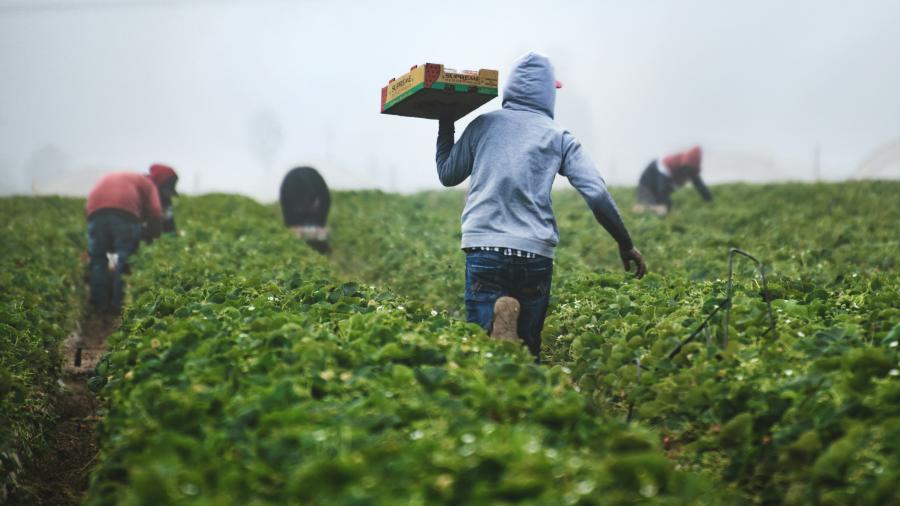
Immigration has always been a hot-button topic in American politics, but the recent presidential election brought this issue to center stage. President-elect Donald Trump’s campaign ran on an extreme anti-immigration platform threatening high tariffs in response to migrant surges and even promising mass deportation events. This prompts an important question: How would highly restrictive immigration policies and potential mass deportations affect the U.S. economy?
For background, survey data from the Pew Research Center shows that “economy” and “immigration” are two of the most important issues voters considered during this election cycle. Working-class Americans expressed their dissatisfaction with both high prices due to inflation and a (purportedly) unsecured border. It may come as a surprise how deeply connected the two policy areas are. Many voters may be unaware of the economic benefits immigrants bring to the country, including tax contributions, increased GDP, and filling in labor gaps — all of which assist in curbing inflation.
The Trump administration’s proposed plans mimic historical attacks on migrant workers like the 1950s policy that oversaw the deportation of nearly 1.3 million people, both documented and undocumented. If plans for mass deportations move forward, the country will be hit with mass labor shortages in crucial industries, resulting in disruptions in supply chains and infrastructure improvement.
According to the Center for Migration Studies, while immigrants work in positions all across the workforce, they make up a majority of workers in the agriculture, construction, healthcare, and accommodation industries. The Center on Budget and Policy Priorities estimates nearly 66% of immigrants participated in the workforce in 2018, about 5% more than native-born Americans. These stats did not include the 550,000 DACA recipients entering the workforce as skilled laborers. Assuming that approximately 4.8% of the American workforce would essentially vanish with the deporation of undocumented workers alone, it could mean a loss as high as $1.7 trillion for the American Gross Domestic Product (GDP). In addition to the loss of GDP, the government would be spending billions of dollars to separate families, disrupt livelihoods, and create a humanitarian crisis at the border.
Regarding entrepreneurship, 1 in 5 new businesses are immigrant-owned bringing in approximately $110 billion in revenue. The Congressional Budget Office predicts immigrants will add nearly $8.9 trillion to nominial GDP in the next 10 years. Not only do immigrant workers make up a large portion of the workforce, but they also do jobs essential to boosting economic growth. According to an American Immigration Council report, mass deportation events would not only result in catastrophic labor shortages in crucial industries but would also significantly stall economic growth.
With immigrants making up 25% of the construction industry, mass deportation events would drastically slow the process of ensuring our infrastructure stays up-to-date. For example, construction management companies in Texas expressed concern about their ability to match pace with population growth. Ray Perryman, the CEO of a Waco-based company, said “The Texas workforce isn’t large enough to keep pace with its growth.” A report from the American Immigration Council echoed statements claiming that Texas needs to utilize U.S.-born and immigrant labor to power the Texas economy.
Similarly, two-thirds of farmworkers are immigrants. Without their labor, the reliable access to fresh produce, meat, and dairy that many people depend on would disappear. In the past, a solution may be to outsource to countries like Mexico for these products, but Trump’s announcement of 25% tariffs on all imports from Mexico only exacerbates the issue. Produce companies in particular cannot plan for these tariffs as their work is climate-dependent. The combination of labor shortages and tariffs would lead businesses to raise prices to offset the losses. In our interview, Matt Mandel, VP of Finance & Legal at SunFed Produce, said they have no choice but to take the costs “on the chin.” SunFed is heavily involved in cross-border trade at the Nogales port-of-entry. He said, “Ultimately, the cost will be passed on to the consumer.”
Unfortunately, this fix is not as simple as replacing immigrant workers with American-born laborers. A case study conducted by The New American Economy and Center for Global Development found that American-born citizens are far less willing to engage in this type of work. Immigrants fulfill positions in labor that native-born citizens avoid, and mass removal of that labor would stall the nation's economy and disrupt essential services we often take for granted. In a statement for NPR, an undocumented woman from Honduras said, “I didn't come to take an opportunity from anyone. What happens is that no one wants to do the dirty work. No one wants to do the hard work.”
Some argue that immigrants drain social services, but many people do not realize the massive tax contributions made by immigrants. Trend predictions estimate that immigrants will contribute nearly $1.2 trillion in taxes across the next 10 years. According to the Institute on Taxation and Economic Policy: in 2022, undocumented workers paid $96.7 billion in federal, state, and local taxes while immigrants as a whole paid nearly $580 billion. In 40 states, undocumented workers paid higher state and local taxes than the top 1% of earners. Regarding social service programs, undocumented people spent $25.7 billion toward Social Security, $6.4 billion toward Medicare, and $1.8 billion in unemployment insurance in 2022 – while they are not even eligible for any of these services due to their immigration status.
In simple terms, President-elect Trump promised to lower prices for everyday citizens, but his approach to immigration and labor does the opposite. Ultimately, people desire security in their homes and confidence that their money is being spent on a better future. Separating families and disrupting the economy in the name of nationalism accomplishes neither. Outside the scope of media disinformation and heated rhetoric lie real consequences for future policy decisions regarding the border. Our economy relies on the labor, creativity, and sacrifices of immigrants. Americans should be acutely aware of this as new leadership takes office.
Cover photo by Tim Mossholder for Unsplash